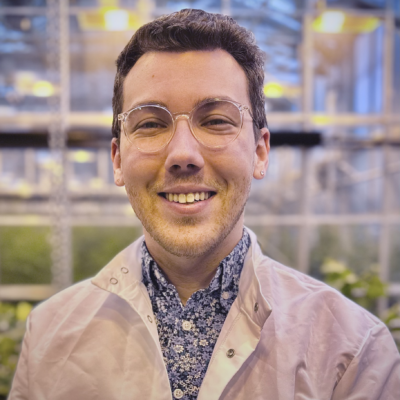Student Spotlight: Brandon Roy

July 25, 2024
Brandon Roy is a doctoral candidate in plant pathology and plant-microbe biology from Phoenix, Arizona and central Pennsylvania. He earned his bachelor’s degree in biochemistry and molecular biology from Lebanon Valley College and now studies grapevine fanleaf virus at Cornell under the guidance of Marc Fuchs.
What is your area of research and why is it important?
I study the plant pathogen grapevine fanleaf virus that causes fanleaf degeneration in vineyards worldwide. Specifically, my thesis research focuses on the protein-specific interactions between the virus and host that make a plant show symptoms of infection. We use several techniques to profile the response of plant hosts to different virus strains that all infect, but only some cause disease. My research aims to decode the immune response linked to disease in this system and hopefully provide new targets for viral resistance.
What are the larger implications of this research?
Viral diseases in agriculture result in billions of dollars in losses each year and threaten food security with a growing global population. It is important to understand the ways in which symptoms arise in plant-virus interactions to treat symptoms.
Virus-host-vector interactions encompass a discipline of research in which we evaluate the methods three organisms work together to use to accomplish the goal of virus spread. Grapevine fanleaf virus brings a contrasting element to previous work in this field as soil-borne transmission is largely understudied in comparison to other systems (such as flying/airborne insects).
You recently returned from a month-long research experience. Can you tell us more about it?
Thanks to a research grant from the Institute of European Studies at Cornell, I was able to conduct one month of research in Colmar, France. This work was conducted alongside collaborators at the Grand-Est Institut national de recherche pour l’agriculture, l’alimentation et l’environment (The national research institute for agriculture, food and the environment, INRAE).
Our work on grapevine fanleaf virus is important to French vineyards that struggle with the heavy presence of fanleaf degeneration. Further, the nematode vector Xiphinema index is not present in New York, and the team in Colmar is the most well-equipped lab in the world for these experiments.
What did this research abroad allow you to do that you may not have been able to otherwise?
Before embarking on this journey, I was able to document grapevine fanleaf virus strain-specific modifications to plant root morphology. Specifically, some strains were able to reduce the amount of root tips and increase the average diameter of the root system. I hypothesized that this observation could be linked to the underground feeding behavior of the nematode.
In France, we performed transmission assays that assessed the presence and spread of virus by the nematode vector, Xiphinema index. This work will contribute directly to my dissertation and help to understand the relationship between plant, virus, and nematode.
What are your hobbies or interests outside of your research or scholarship?
I enjoy running, biking, and hiking in the Finger Lakes as well as taking our springerdoodle, Stella, for walks in Geneva. I love to travel, try new foods (such as pig head or rillettes that I tried in France), and visit every museum in town.
Why did you choose Cornell to pursue your degree?
My first exposure to plant pathology was during my summer internship at Cornell AgriTech in the very same lab I work in today. The Summer Scholar program is a USDA funded internship that provides R1 level research to undergrads. I quickly changed my career goals from a chemistry focus to a plant virology focus.
Additionally, a large part of the graduate school experience is your interactions and relationship with your advisor. Marc was honest, encouraging, and ready to mentor even when I was an intern in 2019. The level of dedication to his students encourages me today even as a senior graduate student. It was important to find a balance between a good mentor and research that I am passionate about; I was lucky to be able to choose both here at Cornell!
